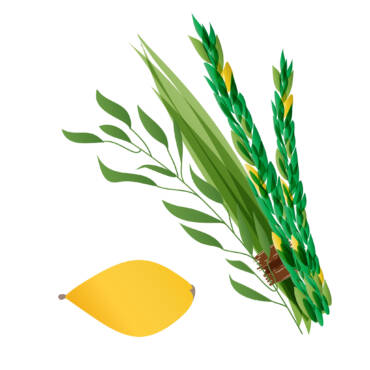Our Summer of Service

When the kids return to school in a couple of months, many will be asked to write a report on the question, “How did I spend my summer vacation?” Likewise, those of us who have trusted in Messiah will one day be asked to give an account of ourselves before God and report on how we spent our summer. Just the summer? What about the rest of each year? Let me explain…
We see in Scripture that each of the Feasts of Israel points to a different aspect of God’s redemptive work in Messiah and, together, they lay out a prophetic calendar. As is considered in our book, “Messiah in the Feasts of Israel,” the major Spring Feasts of Passover and Pentecost picture the salvation work of redemption in the Lamb of God and our sanctification through God’s giving of the Holy Spirit. (Acts 2:1ff) The Spring Feasts were fulfilled through Messiah’s first coming.
The Fall Feasts picture our glorification as Messiah gathers His harvest: at the fulfillment of the Feast of Trumpets, the Body of Messiah will be gathered up to Him. As the Day of Atonement is fulfilled, the people of Israel will be nationally gathered to Messiah Yeshua. (Zech. 12:10) Finally, the Feast of Tabernacles’ fulfillment will bring the gathering of all the nations to Messiah. (Zech. 14:16)
Biblically, we see that we are living in the time between the fulfillment of the Spring and the fulfillment of the Fall Feasts. We are in the midst of the summer; not merely for a season, but until the Lord returns. What does this mean for us?
In Leviticus 23:22, following the outline of the Spring Feasts and before the description of the Fall, we read, “When you reap the harvest of your land, do not reap to the very edges of your field or gather the gleanings of your harvest. Leave them for the poor and for the stranger residing among you. I am the Lord your God.”
This Scripture teaches that following the Feast of Pentecost, the people of Israel were to spend the summer laboring and serving in the fields as they awaited the harvesting and gathering festivals of the fall. This verse gives us insight and perspective on our lives as believers as we live for our blessed hope, the return of Messiah.
Our Primary Vision is for the Lost of the World
“When you reap the harvest of your land…“
Continually working the fields and harvesting the crops is a priority for all in an agricultural society. Yeshua uses this reality to speak of a greater harvest, saying in Matthew 13:37-39, “The one who sows the good seed is the Son of Man, and the field is the world… and the harvest is the end of the age...” He also states in Luke 8:11, “the seed is the Word of God.” As we share the Good News through the power of the Holy Spirit, the Son of Man is sowing the seed of the Word throughout the “field of the world,” and we can expect an abundant harvest to come!
The Lord says in John 4:35, “the fields are white for harvest.” Since the fulfillment of Pentecost, (Acts 2) our work as believers is to share Messiah, a joyful task we can only do this side of heaven. The Holy Spirit’s work in us leads to His work through us. The Lord provides us with the full resource of the Spirit so we may live fully in Him and for Him. He doesn’t put us to work without the resources that are to be used for His purpose and glory.
Our Primary Ministry Reflects God’s Heart
“Leave them for the poor and for the stranger…”
The Hebrew word for “poor” is ani, which means, the afflicted, oppressed, or humbled. The word for “stranger” is ger, meaning, sojourner. Biblically, this was God’s “welfare system;” really a “workfare system,” in that the disadvantaged would also be given the opportunity to gather and eat. As we’ve noted, sharing the Good News is our assumed priority of service. Why then are these Scriptures so focused on the poor?
Remember, you were once “poor in spirit,” and Yeshua reached out to you. Consider then “the least of these brothers of mine,” even the Jewish people, Yeshua’s physical brothers. (see Matthew 25:40) We can be super productive, yet fail to communicate the heart of God and His concern for the hurting people of this world.
The word Leviticus 23:22 uses for the poor, ani, is used by the prophet Isaiah regarding Messiah’s affliction:
“Surely our griefs He Himself bore, and our sorrows He carried; yet we ourselves esteemed Him stricken, smitten of God, and afflicted.” (Is. 53:4)
“He was oppressed and He was afflicted, yet He did not open His mouth; like a lamb that is led to slaughter, and like a sheep that is silent before its shearers, so He did not open His mouth.” (Is. 53:7)
Scripture also refers to Yeshua as a stranger:
“I was a stranger, and you invited Me in … Then the righteous will answer Him,… ‘And when did we see You a stranger, and invite You in…’ ‘The King will answer and say to them, ‘Truly I say to you, to the extent that you did it to one of least of these brothers of Mine, you did it to Me.’” (Mt. 25:35, 37-40)
“I am the Lord your God.”
Our work is given by the direction of God. God will reward what you leave in the field. Why? He rewards what faithfully reveals His own heart.
As we are concerned for the afflicted and the stranger, even as we reach out to Yeshua’s physical brothers who have been estranged from the Good News, we show concern about the Lord and His love for people. In His humility He came that we all might be accepted in Him. Since we have been accepted in such an incredible way, let us accept one another in His love, for in so doing we demonstrate the grace and love we have received in our Messiah.




Add Comment